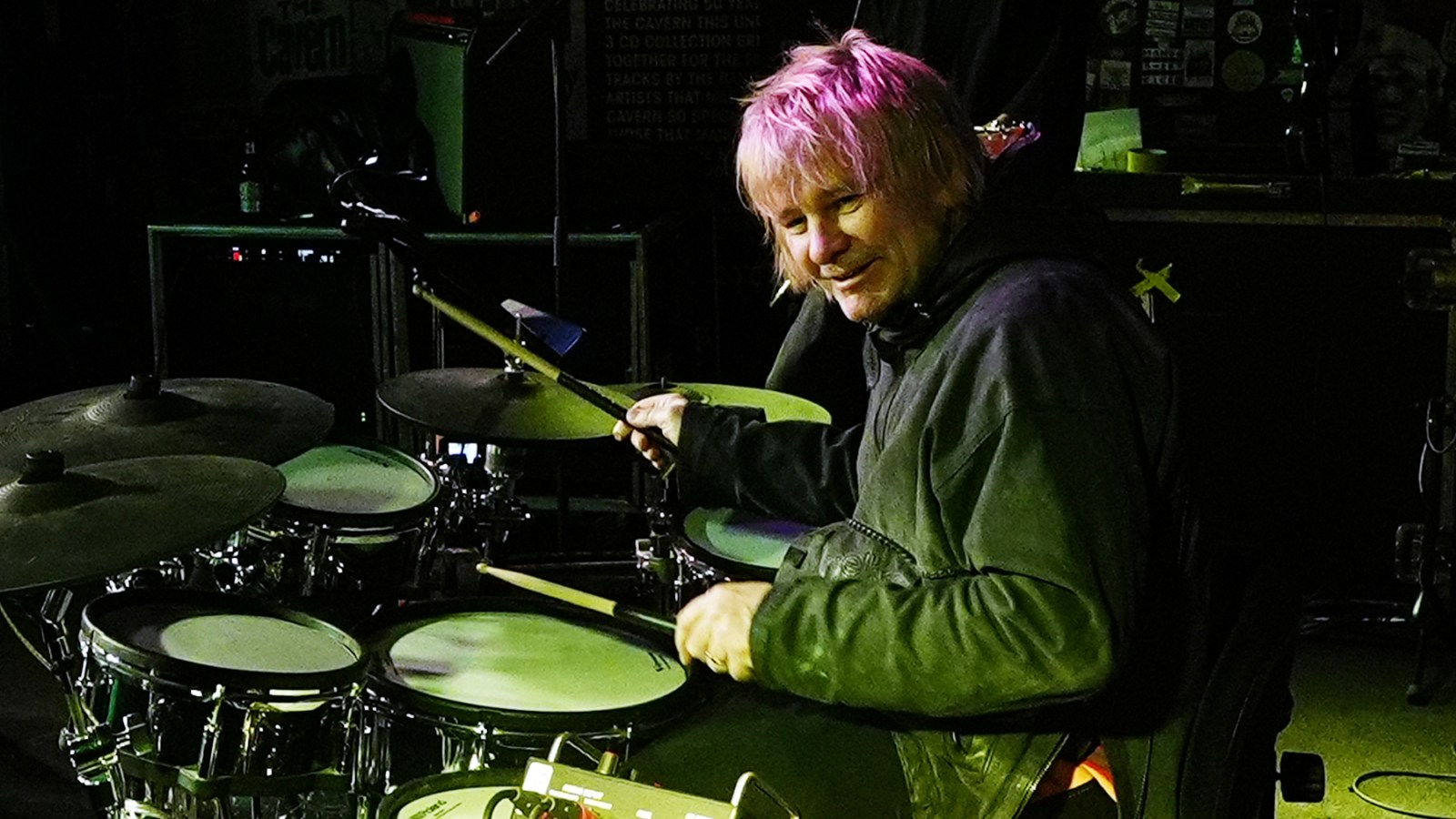Welcome to Drummergeddon 2025, when the entire music world wants to know: What the hell is going on with the drummers? There’s an epidemic of high-profile bands dumping their drummers, or getting dumped by them, and nobody has any clue why. It’s not just the Who or the Foo Fighters. It’s not just Nine Inch Nails or Pearl Jam or Primus. It’s not even just GNR or Oasis or Iron Maiden. It’s a host of rock and metal bands from different genres, at different levels of fame, shuffling their rhythm sections in a full-blown global percussion crisis. How did this happen?
The Drummerpocalypse just keeps hitting new levels, reaching a farcical peak last week when the Foo Fighters and Nine Inch Nails traded drummers. The Who’s battle with ex-stickman Zak Starkey keeps raging on, after they fired, re-hired, then re-fired him this spring. Last weekend, Roger Daltrey went off in the Times, accusing Starkey of “character assassination.” Zak summed up the chaos back in May when he told Rolling Stone, “What the fuck? These guys are fuckin’ insane! I’ve been fired more times than Keith Moon in ten days.”
But this year, we’re definitely seeing a vibe shift behind the kit. The Foo Fighters startled everyone in May by firing Josh Freese, one of the rock world’s most dependable (and most-employed) rhythm kings. They just announced his new replacement: Ilan Rubin, from Nine Inch Nails. This is weird because Freese used to play in Nine Inch Nails—and Rubin is the guy who replaced him when he left in 2008. Now Freese has rejoined his old mates, replacing his replacement, as if Rubin were just keeping his throne warm for the past sixteen years.
There’s never been a scenario like this: two of the world’s biggest rock bands switching drummers like it’s a baseball trade. (Did Trent have to kick in some draft picks? Did Grohl need another left-hander for the post-season roster before the trading deadline?) There’s nothing comparable in history. The closest thing to a similar swap, according to Rolling Stone’s resident lore-master Andy Greene, came in 2003, after Metallica’s bassist Jason Newsted quit the band. They hired Robert Trujillo away from Ozzy’s band—so Ozzy replaced him with Newsted. But this is far crazier, given the drummers’ linked history.
The Freese drama is a shocker because he’s the definition of a sure thing. He’s played with everybody. I’ve seen him live with Weezer, Devo, Paramore, the Replacements, probably others. But there’s also GNR (he replaced Matt Sorum), A Perfect Circle, Sublime With Rome, Lana Del Rey, Sting, Kelly Clarkson, Ween, Avril Lavigne, Katy Perry, Ricky Martin, even the Buffy musical episode. He joined the Foos in May 2023, stepping in for the late Taylor Hawkins. So everyone was stunned when he got the axe — especially Freese, who said, “In my forty years of drumming professionally, I’ve never been let go from a band.”
But these are strange days for drummers. This week, Freese hits the road with Nine Inch Nails, while Rubin gets cozy with the Foos. This situation is basically one staircase crash away from Showgirls.
Meanwhile, the Zak Starkey melodrama has turned into the messiest Who soap opera since Lifehouse. As Ringo Starr’s son, Zak grew up around Keith Moon and got drum lessons from him, then played with several million bands before spending nearly 30 years in the Who. He held the job longer than Moon ever did. But in April, they fired him for allegedly playing too loud (in the Who?), after Daltrey missed a cue in “The Song Is Over” at the Royal Albert Hall. They rehired him two weeks later (“News Flash! Who Back Zak!” Pete Townshend posted), but then Cousin Kevined him out of the band again two weeks later. It’s blown up into the most notorious controversy over a dumped drummer since Zak’s dad took over from Pete Best.
If there was a tipping point for Drummergeddon, it might have been the weird moment back in 2024 when three of the world’s top metal bands — Sepultura, Slipknot, and Suicidal Tendencies — rotated their tubthumpers. Jay Weinberg got kicked out of Slipknot, but signed on with S.T., whose Greyson Nekrutman quit to join Sepultura, after Eloy Casagrande left to play for Slipknot. Fans were puzzled, but as Sepultura guitarist Andreas Kisser mused, “Maybe it was better for everyone.” Suicidal Tendencies, of course, used to have Trujillo on bass, for The Art of Rebellion. And who played drums on that album? Josh Freese.
To add extra levels of irony, Jay Weinberg’s dad keeps time for a guy named Bruce Springsteen. At 74, Max Weinberg hasn’t lost a drop of his superman stamina, but not even Bruce knows his secret. “Max is a human marvel,” he told Rolling Stone this summer. “So the guy comes out and plays basically for three hours straight without stopping. He stops, maybe there’s 30 seconds where he gets to take a sip of water twice, two or three times during the night.”
Look, drummers have it tough. We take them for granted. They work so hard for us, and get so little respect. They suffer so much physical and emotional torment, forever the butt of jokes. What’s the difference between a drummer and a large pizza? What do you call a pretty girl on the arm of a drummer? What do you call a drummer wearing a tie? They’re the musicians that bands replace most ruthlessly, the ones producers shuffle in and out at will, ever since the Beatles ditched Pete for Ringo. Or for that matter, ever since George Martin replaced Ringo with a session guy for “Love Me Do” and demoted Zak’s dad to tambourine. (BTW, a large pizza will feed a family of four, a tattoo, and the defendant.)
The drummers take the most punishment physically—as with baseball catchers, there’s a ceiling on how many innings the muscles can take. When Primus drummer Tim “Herb” Alexander quit last November, he didn’t mince words. “Being a drummer for almost four decades has taken its toll on my body,” he told Rolling Stone. “As I said previously, my body hurts, My hands hurt. My back hurts.”
Drummer culture is its own tribe within the music world, with a language that’s designed to be incomprehensible to outsiders. How drummers snicker when the rest of us say “in the pocket” or “sick groove,” the way Marines snicker at civilians who say “semper fi.” To normal people, “Don’t Stop Believin’” is a Journey song. But for drummers, it’s the sound of acclaimed jazz-fusion virtuoso Steve Smith, winner of many magazine polls, playing an intricate open-handed pattern in which he plays the hi-hat with his left hand while his right moves around the kit. (That’s a direct quote, from Rolling Stone’s awesome Greatest Drummers of All Time list, proudly compiled by drummers for drummers. I have no clue — don’t all drummers’ hands “move around the kit”? Isn’t that like what a drummer freaking does?) But that’s the point. Percussion heads have a certain defensive hostility when it comes to the outside world; you have no idea what they’re talking about, and they like it that way.
That’s because the drummer has a unique place in music culture, providing the forward motion. If your stickmaster sucks, it simply does not matter how good anyone else in the band might be. You might not know the name of the drummer on “Maggie May,” “Midnight Train to Georgia,” “Just Like Heaven,” or “We Are Family,” but they’re a key reason you still hear these songs on the radio. (Micky Waller, Andrew Smith, Boris Williams, and Tony Thompson.) Even at a pop show, when you go see Taylor Swift, Olivia Rodrigo, or Harry Styles, you’re getting rocked by Matt Billingslea, Jordi Radnoti, or the mighty Sarah Jones. Everybody loves the story about Charlie Watts punching out Mick Jagger and telling him, “Never call me your drummer again. You’re my fucking singer.” If you think Charlie was exaggerating, just listen to any of the solo records the Stones made without him. Or name one.
Yet the drummer is the first to get blamed when things go wrong. History is full of rhythmatists who get the axe when their band hits the big time — Steven Adler, Chad Channing, Stan Lynch, Vini Lopez, replaced by iron men like Grohl or Weinberg. Nobody notices when the bassist slips up. If the singer has an off night, the show goes on. But the drummer has nowhere to hide.
Guns N’ Roses just replaced Frank Ferrer in March, nearly two decades after he played on Chinese Democracy, as did Freese. “An amicable exit,” the band called it. Axl Rose, the essence of amicable, greeted the new kid Isaac Carpenter by bitching him out onstage in Yokohama, Japan, for playing “Mr. Brownstone” when Axl was in the mood for “Bad Obsession.” Welcome to the jungle, dude.
Drummer Josh Freese performs onstage with The Vandals during day 1 of Warped Tour at Shoreline Waterfront on July 26, 2025 in Long Beach, California.
Scott Dudelson/Getty Images
Iron Maiden legend Nicko McBrain quit touring in December, after recovering from a 2023 stroke. They replaced him with Simon Dawson, though McBrain remains an official member. “You may ask yourself, how do I feel about a new drummer taking my place after 42 years?” McBrain said on July 26, at a solo gig. “Well, the simple answer is, I’m still the best-looking bloke in Iron Maiden.”
Pearl Jam’s Matt Cameron quit in July, 27 years after he came in from Soundgarden to replace Jack Irons. They still haven’t announced their new banger. But maybe they could snag Irons — he famously crashed their Hall of Fame induction ceremony without an invite and bumrushed the drums for their final song, which is serious Hall of Fame mojo. Umphrey’s McGee jam wizard Kris Myers stepped down in May, a couple years after rotator-cuff surgery.
Oasis replaced Chris Sharrock, their last pre-break-up drummer, even though he played in both Gallagher brothers’ solo bands. But they hired Joey Waronker, another one of those sure-thing pros who’s held down countless gigs, from Beck to R.E.M., from Neil Diamond to Paul McCartney. Bob Dylan switched Jim Keltner with Anton Fig in March. As for Primus, when Alexander quit, they brilliantly turned the audition process into a public spectacle, with their “Interstellar Drum Derby.” Even Les Claypool’s pal Billy Strings made a hilarious audition video for the gig, before they finally found new guy Jack Hoffman.
Through it all, the Who’s Zakrophenia drama never ends. Starkey complained bitterly about “the weeks of mayhem of me going ‘in an out an in an out an in an out like a bleedin squeezebox.” Even Ringo, the easiest man to get along with since human beings were invented, got dragged in when Zak quoted him as saying, “I never liked the way that little man ran that band.”
Daltrey denounced Starkey in the Times last week, saying, “It was kind of a character assassination, and it was incredibly upsetting.” He also introduced a new account of the infamous “Song Is Over” debacle that started the trouble, now blaming it all on the sound crew. The 81-year-old singer explained, “It is controlled by a guy on the side, and we had so much sub-bass on the sound of the drums that I couldn’t pitch.” But as he bluntly put it, it can’t be his fault, because he’s the boss. “Pete and I retain the right to be the Who,” he told the Times. “Everyone else is a session player.” In other words, the IP is the shotgun that sings the song.
That might be one reason Zak Starkey has blown up into such a cult hero for people who ordinarily don’t care a thing about lineup changes in classic rock bands. The Zak saga seems to resonate with people way outside the Who’s normal audience, people who can’t tell Rabbit Bundrick from Pino Palladino, or “A Quick One” from “The Quiet One.” But people can relate to Zak, the hard-working creative betrayed by his corporate boomer bosses, who slip up and make him the scapegoat, tossing him aside like a discarded plectrum. It’s cool to see him refuse to go quietly. Maybe that’s why this tale has taken on a mythical life of its own in 2025. But it’s the biggest Who buzz in decades, and the most popular save-the-drummers parable of the past 60 years. Meanwhile, Pete Best happened to announce his retirement back in April. (Hey, you don’t think…)
Do we even have to mention that Zak used to be in Oasis? He even texted the Gallagher brothers to let them know he suddenly was in the job market this summer, or as he put it, “Why the fuck aren’t I in your band, man, helping make it the greatest rock band in the world again?” However, Noel and Liam have Waronker for their reunion tour, and they’re wisely not letting him get away.
These are definitely weird times for drummers and those of us who worship them. But the Drummergeddon chaos hits home for people who don’t even like any of these bands, simply because it hits to the emotional core of music, especially live music. Percussionists do more than just keep time — they’re the ones who make a band a band. The drummer represents the whole ideal of the band as a community, one nation, indivisible, with Liberty and DeVitto for all. That’s why the spirit of the drum lives on in anyone who confronts a stick and a snare and asks, “What can this strange device be?” (R.I.P., Neal Peart.)
“I’ve already got my gravestone,” Zak told Rolling Stone. “It says, ‘Zak Starkey, the song is over.’” Well, maybe. But he’ll probably just eventually join Oasis again, so he can snag a cooler epitaph like “Where were you while we were getting high?” That’s the thing about drummers: you can’t keep a good one down. They get work. They move around. Every performer needs a good drummer, and everybody who’s got a good one wants a better one, even if they have to steal, poach, or kill. It’s too soon to tell where all this upheaval will lead. But you have to suspect the drummers will be the last ones standing. Now more than ever, it’s time to give the drummer some.



